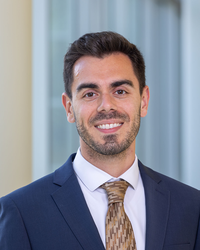| When: Tuesday, 11/5/2024, 10:00 am - 11:30 am |
| Where: Henry B. Gonzalez Convention Center-006 |
| Credits: 1.5 CME_Physicians Credits |
| Credits: 1.5 CME_OtherProfessions Credits |
Description: Join this insightful session that addresses the pressing issue of obesity within transgender and gender-diverse populations. Discover the distinct physiological and hormonal changes that contribute to weight challenges in this community. Gain a deeper understanding of the psychological, behavioral, and discriminatory factors that play a role, including a patient sharing their personal experiences.
|
| Delivery Mechanism: Live In-Person |
| Keyword: Behavioral Psychology: Psychosocial-Other; Target Population: LGBTQ/Gender studies; Treatment: Clinical Practice |
Track: Sub-track: Advancing Equitable Care; Track 1: Metabolism and Integrative Physiology; Track 5: Clinical/Professional Practice
|
|
Speakers:
 | John M. Taormina, MD | Session Chair | |  | Vin Tangpricha, MD, PhD | Understanding the Physiology Changes in the Transgender Population With Obesity | 10:00 am - 10:20 am |  | Emily Panza, PhD | Multilevel Considerations for Weight-related Care Among Transgender and Gender Diverse People | 10:20 am - 10:40 am |  | Jaime E. Fivecoat, MBA | Patient Perspective | 10:40 am - 11:00 am |  | John M. Taormina, MD | Moderate Panel Q&A | 11:00 am - 11:30 am |  | Emily Panza, PhD | Panel Q&A | 11:00 am - 11:30 am |  | Jaime E. Fivecoat, MBA | Panel Q&A | 11:00 am - 11:30 am |  | Vin Tangpricha, MD, PhD | Panel Q&A | 11:00 am - 11:30 am |
|
|
| Learning Objectives: |
| 1. Apply the latest recommendations for evaluation and treatment; tailor intervention strategies based on patient characteristics such as age or metabolic or behavioral phenotype; understand the differences between weight loss and weight loss maintenance. |
| 2. Understand the evidence-based science regarding neuroendocrine, environmental, endocrine, microbiota and/or cognitive behavioral mechanisms regulating energy balance and body weight. Apply that knowledge to develop and implement treatment options for adults and pediatric patients with overweight, obesity or obesity-related co-morbidities. |
| 4. Apply lessons learned about the impact of nutrition and obesity initiatives and policies to reduce health disparities and stigmatization of individuals with obesity. |
| 5. Apply new knowledge related to obesity treatment options from the perspectives of Metabolism and Integrative Physiology, Neuroscience, Intervention and Clinical Studies, Population Health, Clinical/Professional Practice, and Policy/Public Health. |
|
|